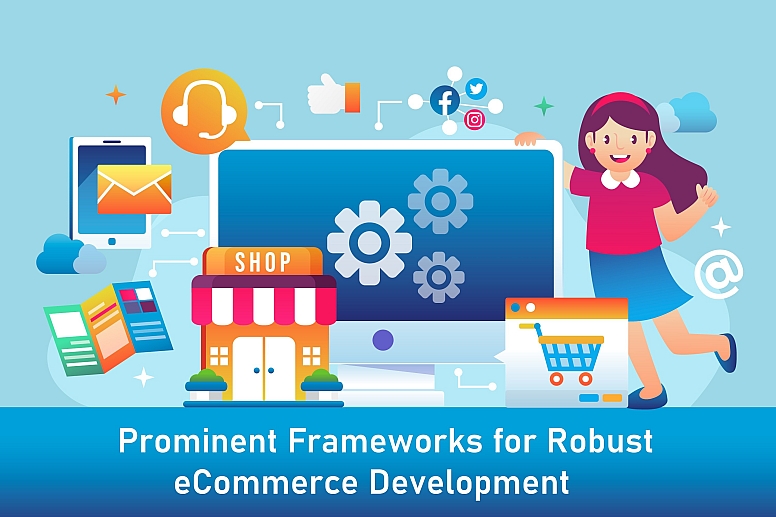Prominent Frameworks For Robust eCommerce Development
February 5, 2024E-commerce is the next big thing. It is expected to rise on an upward trajectory with time because, as consumers, they prefer online shopping to retail shopping for its sheer convenience. Also, the e-commerce market is expected to grow by $6.3 trillion in 2023.
It all boils down to choosing the best e-commerce development framework for your website. Plus, the framework you choose will directly impact the store’s performance, as it is the core foundation for creating a system for the sale of online goods. Depending on your project, you can choose a robust framework that’ll help scale your website in the later stages.
Role of Robust E-commerce Development Frameworks
In simple words, the kind of programming used for building an e-commerce platform is known as its framework. Different frameworks have different functions and features that are customizable to suit any unique requirements.
Developers choose frameworks to build e-commerce sites to facilitate the development process. However, a robust framework comprehensively suits your company’s strategy, product range, goals, and communications mediums.
The framework you choose can affect your eCommerce website drastically, so you must consider all aspects. Let’s start by identifying some prominent frameworks to understand which framework works and creates the best eCommerce online stores.
Prominent Frameworks for eCommerce
Laravel
Laravel is one of the most well-accepted frameworks for eCommerce development, as it offers the best scalability for an e-store. It offers sustainable libraries that help build a site from scratch.
In addition, it features server and application security features. Planning the workflow is simple, as the framework offers seamless task scheduling for management and configuration. With pre-developed open source, you can save time and money as it is a customized problem-solving approach for error-free development.
Laravel has the best community support and access to online tutorials that help understand the framework. You can integrate it with many interfaces to improve the user experience. Database migration and testing features make it the best choice for e-commerce development.
Angular
When it comes to e-commerce development, Angular is an exceptional choice. It is an open-source framework and one of the top choices for creating eCommerce apps and stores.
The framework features minimal coding, making e-commerce development hassle-free. Beyond this, it maintains high-quality web pages and is SEO-optimized.
Angular uses MVC architecture to build an engaging user interface for your online store. Built-in enhanced web security features safeguard customers’ data against malware and streamlines the process of data recovery.
With beautiful eCommerce templates, you can create dynamic websites. Besides, modular architecture helps developers build user-friendly e-stores. There is strong and growing community support for Angular, which is a plus.
Ruby on Rails
For a dynamic website, the number-one option would be Ruby on Rails. It follows a model-view-controller architecture, mostly preferred for e-commerce development.
With this, it does not require manual configuration in development, saving time. Besides sustainable design, it uses simple design patterns that new developers can understand.
The framework uses salt and hash user password support, which reinforces security and makes it impossible to crack. While building your store on the framework, you can move your website to different hosts. Many tools and resources are available for simple integration to enhance your eCommerce store.
Read: Introduction to MyApp TCS: Know The Steps to Login
Vue.js
In JavaScript frameworks, Vue.js is the most popular choice. The reactivity feature of the framework makes it easy to build responsive user interfaces and dynamic e-stores. Developers can manage complex dependencies with computed properties and reactive data.
In addition, it features performance optimization that helps build efficient eCommerce sites. You can expect faster rendering times and the ability to split code components with the framework.
With a simple learning curve, it is easily accessible at different skill levels. Besides, you can import Vue.js as a library from CDN. With this, you can follow composable architecture principles without the need to rewrite your website.
WooCommerce
It’s a WordPress plugin that converts a website into an eCommerce store. WooCommerce offers seamless WordPress integration and unprecedented flexibility. Plus, it features inbuilt payment processing, which is simple to set up in your online store.
Apart from large extension libraries, it also offers extensive themes that can set your site apart from the rest of the e-stores. In addition, you will get an SEO advantage with WooCommerce that can help your site with SEO rankings.
Smooth integration with marketing tools is something you will love about WooCommerce. Also, it features local customization and in-depth documentation.
Flutter
Flutter is the most preferred cross-platform framework for developing eCommerce websites and applications. The development time taken by Flutter is less than that of other frameworks.
Plus, its hot reload function makes it easier to track changes. The framework works on an object-oriented programming language and features flexible widgets.
Using the pre-existing UI elements, developers can improve the site’s UI. In addition, the Flutter architecture is built on the principles of reactive programming.
According to developers, Flutter is an ideal framework for developing MVPs. One of the key features of Flutter is that it offers faster time to market as you can speed up the development process.
ASP.NET
ASP.NET is another framework that helps you create dynamic and scalable eCommerce applications and websites. Scalability is the number one feature of ASP.NET because it easily accommodates big e-commerce businesses.
Plus, it can provide robust security features such as SQL injection and cross-site scripting. Performance-wise, the sites are known for their stability.
In addition, you can use free development tools that support 20+ programming languages.
For eCommerce, it’s vital to know about continuous tool development, and ASP.NET is the best for such cases. Since ASP.NET is open-source, expect a simple learning curve.
Django
Django is a powerful web framework for building eCommerce stores. ORM, a template system, and a powerful admin interface enable quick development.
Besides, features like load balancing allow for handling a large amount of traffic on the site. The built-in security features, like password hashing and authentication, ensure complete website security. With the SEO feature, you can improve your e-commerce site’s ranking in the SERP. Because it’s an open-source framework, it is quite affordable.
In terms of faster development, using Django is the best choice. With cross-platform compatibility, your site will be compatible with multiple platforms. Django will receive updates for an extended period.
In Conclusion
Every business has a specific set of project requirements. Before choosing a framework, you must know about your business model, sales forecast, and scalability. Among all the prominent Frontend and Backend Frameworks, CMS platforms and other tools, you have to choose the right one that best fits your business plans and requirements. Also, consider the purchase cost and scale of expansion. Your framework choice will make a vast difference in your final result. If you want to grow your business and sustain it for a long time, choose a framework that will resonate with your online business goals.



